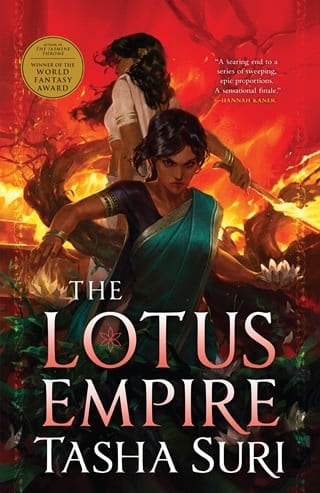Chapter 17 Rao
RAO
After seeing Malini, he returned to his old rooms. He bathed, and tried to eat a meal, and tried to sleep. Only the bathing was successful.
He was wounded. He’d made no useful efforts to hide the truth of it. Did everyone know how much he drank? Did they distrust him for it?
He settled on lighting a pipe and sitting out on his veranda, where he could watch the sun lower in the sky, and the gold of dusk bleed over Harsinghar, turning the white city bloody.
To stay and fight in the coming war. Or go home.
Malini had not given any consideration to the idea of him returning to Alor. He could have begged, but he hadn’t. He knew when she couldn’t be moved. But now, breathing out smoke, he considered the idea of going anyway. Simply leaving on a horse without a word, taking nothing with him. The thought of it was sweet.
To go back to Alor, the place he’d left as a boy. Or to go to Dwarali, as Malini had ordered. To chase a myth.
He wanted to go home.
Dwarali would not be unfamiliar. He had lived in the Lal Qila briefly, when Malini’s war against Chandra first began. He knew how the snow lay in a heavy white gauze over the distant mountains, and the way coldness of the air there bit more sharply than even the deepest nighttime chill he had ever known in Parijat. But he had not been born there, as he had been born in Alor, or reared there, as he had been in Parijat.
Once, he would have listened to the call of the nameless. The vision that had struck him in Sima’s rooms—of white snow, bloodied mountains—was a clear message from his god. Go to Dwarali.
But he hadn’t felt any love in his head or heart for the nameless god since Aditya’s death. That was the truth he could not admit to anyone. It had stopped him like a hand to the throat when he had tried to enter Harsinghar’s monastery garden and seek the gentle guidance of a priest of the nameless, in those first raw days after Aditya’s death.
There had only been one priest that Rao had wanted to guide him, in truth. One gentle, blue-garbed priest with a smile on his mouth and eyes that could pin you—eyes gray and deep and sure. And that priest was dead.
Rao’s faith had died with Aditya. That was the truth Rao acknowledged now. The nameless had guided Rao’s every step; had shaped his fate, had given him a prophecy for a name, had set his feet on the path that had led him to his position now, as general to the empress. But it was the guidance of the nameless that had killed his sister Alori and made Aditya kill himself. The nameless god had left Rao utterly alone.
I have no more faith to give you , Rao thought—speaking to nothing, nothing but the heartsick void inside him. I refuse.
He began with the arrack. A bad choice. It was vile, milk-sour, filling his belly. But he didn’t let the taste stop him. He drank more.
It was deep, dark night when the drink finally submerged him. Darker still, when he rose back up from its depths, eyes snapping open.
It was much like being out at sea had to feel. His head was swimming, his limbs light and heavy all at once. And his heart—his aching heart—was finally calm.
He felt in himself a tug that wasn’t from the nameless but from himself. He rose up onto his unsteady feet and began walking.
He knew the mahal well. Had run through its corridors as a boy, when he’d first arrived in Parijat to be Prince Aditya’s companion; had fought with Aditya in the training ground he could see through the windows to his left. The same latticed windows that his sister and Malini and their little friend Narina had once stood at to watch the fighting, their eyes birdlike, bright and curious. He knew the way to the imperial temple, too, although he had never had any particular reason to go there as a boy.
Sometimes the places you have not been are a hollow, an absence with a shape. He followed the emptiness.
The imperial temple was quiet.
Maybe he was simply lucky. There should have been priests around, sweeping the steps or lighting the lanterns that kept the temple illuminated all through the night. But the lanterns were bright in their sconces, and Rao could only assume that somehow he’d just missed the moment the priests had drifted through the temple, checking the flames and laying fresh flowers at the feet of the mothers. He was entirely alone, surrounded by cottony silence, as he walked on heavy feet into the temple.
The night was chilly, and the curtains that lined the central prayer hall were in motion.
At the end of the hall, he could see the gold-hewn statues of the mothers.
A new statue had been placed to their left. Male, tall. Smiling, hands open in welcome.
Aditya.
Rao drifted toward him. He was carved in wood. In the night’s shadows, in the dark where the glow of torchlight gently illuminated him, his wooden form could have been flesh. He could have been alive.
“Aditya,” he said. His voice cracked as it left his throat, and a spill of unwanted tears fell from his eyes. There was no relief or release in them. Just an ugly upwelling of grief that suffused him like fire. He strode forward and gently clasped that face, that cold carved face fixed into a smile, and thought, I should have done this while you lived .
He did not think. The drink had him, and the pipe, and the grief. It was simple enough to press his own mouth to that carved face. That ever-smiling mouth.
It was cold beneath his lips. It did not warm. It never could.
Later, he would not remember leaving the imperial temple, or crossing the mahal’s grounds—or even consciously choosing his path. All he’d recall would be the coolness of wood against his face as he leaned his wine-flushed forehead against the door to Sima’s rooms. The thud of his own fist against it. And his own voice, croaking out of his throat:
“Sima, it’s me. I’m sorry.” A pause. “May I come in?”
One of the guards standing to the side of the door shuffled from one foot to the other and said, in a low voice, “She cannot stop you, my lord. If the prisoner has done something—”
“I won’t come in,” he said loudly, clearly, anger giving his voice fuel. “Unless you say I may.”
Silence. Perhaps it lasted only seconds, or perhaps it lasted a great deal longer. Rao, in his current state, could not tell. But he felt it when a hand rapped smartly on the door from the inside, and when a firm voice spoke through the barrier of wood.
“Come in, Prince Rao,” Sima said.
He unbarred the door and stepped in.
She looked the same as she had the first time: tired and rumpled, and wary. But she wasn’t carrying a makeshift weapon this time, which was good. She looked him up and down, and her mouth tightened.
“You’re drunk, Prince Rao,” she said. “Your soldiers should return you to your chambers. You won’t get what you’re looking for here.”
“I am not here looking for anything,” he said stupidly, shutting the door behind him. He leaned back on it. Not dizzy but—weakened. “What do you think I’m looking for?”
She pursed her lips, then said, “Tell me what you need from me, my lord.”
Black exhaustion was blooming at the edges of his vision. He blinked it back. “I am going to Dwarali,” he said. “I am accompanying Lady Raziya to the sultan’s mahal, and then—I will go to the Lal Qila. And I will… stay there. For a time. Sima, I am here to ask—will you come with me?”
She gave him a blank look.
“Come with you,” she repeated.
“Yes.”
“If you say I must, then I will,” she said. “And if you decide to leave me here again in this room—well. Then what am I meant to do? Your men said it themselves. I’m a prisoner. I go where you decide. Why are you asking what I think?”
He could not faint here again. He wouldn’t blame Sima for killing him if he did. He’d been nothing but trouble to her—and to Lata. And to himself.
But he could do her this one kindness.
“Dwarali is far from Harsinghar,” he said quietly. “Far from Parijat, and the empress, and all imperial concerns. And some say… some say the Lal Qila is on the edge of the world. A woman who vanished there… I think, if she wanted to, she’d never be found.”
Sima stared at him silently, some terrible emotion rising on her tired face.
“Don’t try to trick me,” she said wretchedly. “If you’re trying to find out if I’m a traitor, if I—I’m Ahiranyi , I can’t and won’t change that, so let your empress execute me, if that’s what she wants—”
“No,” Rao said forcefully, alarmed. “No, Sima, please, calm yourself—”
“Don’t tell me to be calm.” She was shaking, her voice rising in pitch—but she was trying desperately not to shout, and that turned her voice into something wavering and strangled. “You can grieve and drink and go anywhere and do as you wish but I—I’m not allowed to grieve all I’ve lost! And I have to stay in this fucking room until I die! I—” She stoppered her own voice, shoving one palm against her mouth. Squeezing her eyes shut.
He swallowed, forced himself to stand straight, and took a laborious step toward her.
“Sima,” he said. No answer. “Sima, I am sorry. I…” Another step. “There are people even now, in Parijat, who care for you. I have been a bad ally to you. And nothing like a friend. But I am… I am one of those people who wish you well. Who trust you. I am not trying to trick or trap you. I am offering you a way forward. What you do with it… that, I leave to you.”
Sima was breathing shallowly. Then she rubbed her hand over her eyes, freeing her own mouth. Gasped a deep breath. Another.
“Who else?” she said.
“What?”
“Who else cares for me? Wishes me well?”
“One of Prince Ashutosh’s men came to talk to me,” Rao said. “On your behalf. Romesh.”
“Oh,” she said. “Good.”
“And Sahar, the empress’s new guard,” he added.
She nodded, once. Looked at him with teary eyes.
“I will come to Dwarali with you.” There was determination in her voice. Somehow, in that paroxysm of feeling, she’d made a choice. Then, as if the words were being wrenched out of her, she whispered: “If I stay in here any longer, I won’t survive.”
“Dwarali, then,” he said. “And a future where you’ll live. That’s what I promise you.”
 Fullepub
Fullepub 



